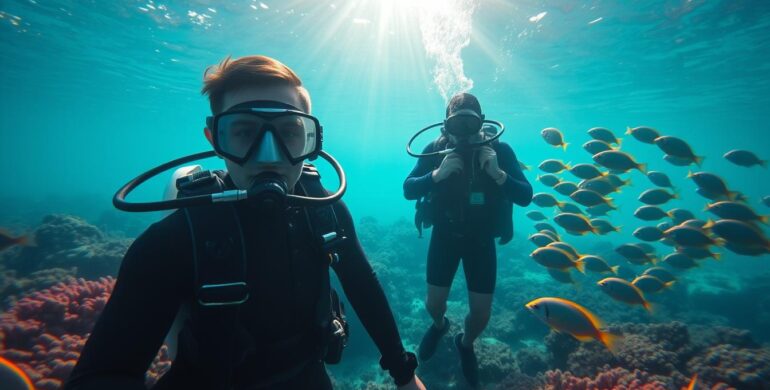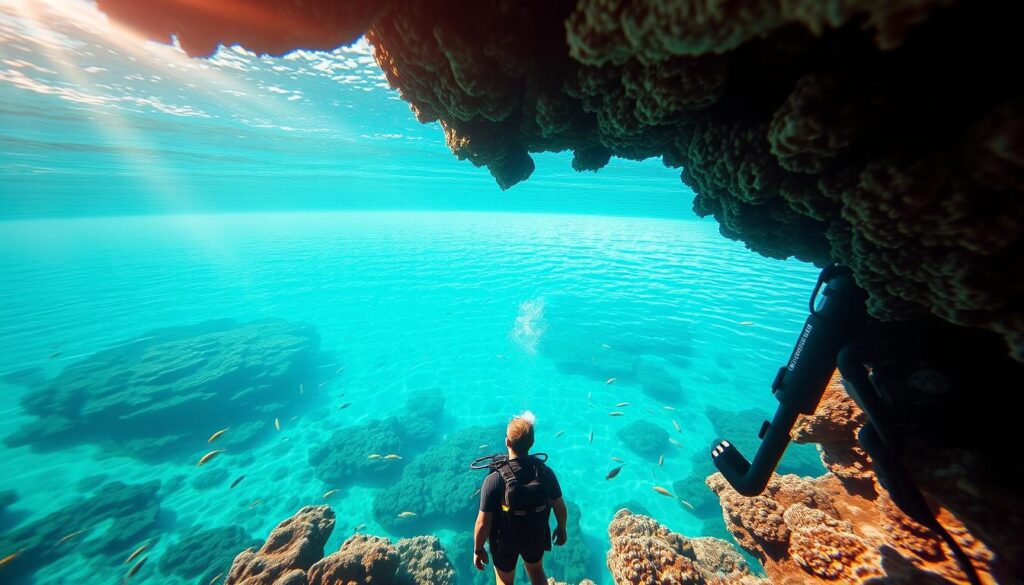
Scuba diving is a fun way to see underwater beauty. It’s super important to stay safe to enjoy these dives. Following safety rules makes diving safer and more fun.
Key Takeaways
- Prioritize scuba diving safety essentials to ensure a secure diving experience.
- Get certified by a reputable diving agency.
- Always dive with a buddy and perform thorough pre-dive checks.
- Create and stick to a detailed dive plan.
- Ascend slowly and practice proper buoyancy control.
- Stay within your training and experience limits.
Get Certified by a Reputable Diving Agency
Getting a scuba diving certificate is key. It makes sure divers are safe and know what they’re doing. It starts with training on important safety rules. This makes diving fun and safe.
Importance of Certification
Certification courses teach divers lots of important things. They learn about diving science, how to use gear, and what to do in emergencies. This training helps divers be safe under water. Without it, they might not know how to avoid danger.
Choosing a Professional Diving Instructor
A good teacher makes a big difference in learning how to dive. Pick someone skilled and experienced. They’ll teach you theory and practice. A good instructor also stresses safety. They’ll get you ready for different situations under water.
| Agency | Course Duration | Main Focus Areas |
|---|---|---|
| PADI (Professional Association of Diving Instructors) | 3-4 days | Diving physics, emergency protocols, gear management |
| NAUI (National Association of Underwater Instructors) | 4-5 days | Rescue skills, dive planning, safety procedures |
| SSI (Scuba Schools International) | 3-4 days | Scuba diving certification importance, underwater communication |
Never Dive Alone
Diving with a buddy is very important for safety. Having a partner means help is always near, especially in unexpected situations. This rule is a big deal among divers.
The Buddy System
The buddy system in scuba diving does more than add fun. It’s crucial for staying safe. With a buddy, someone else can watch out for danger, check gear, and help with directions. In emergencies, like if your air stops working, they can share theirs with you.
Monitoring Each Other’s Safety
Staying alert is a must when diving with a buddy. Always check each other’s gear and how much air you have. Doing this helps you catch problems early. You should also talk clearly and stay close to manage risks well.
Beginner Scuba Diving Tips for Safety
Starting your diving journey? Learn key skills for your safety and fun. These beginner scuba diving safety tips cover important things like staying balanced, watching your air, and talking underwater.
Staying balanced underwater is key for safety and to protect sea life. Work on controlling your buoyancy to float easily. This helps avoid harming coral reefs.
It’s vital to keep an eye on your air. Watching your tank gauge tells you when it’s time to go up. It keeps you prepared for any surprise.
Talking to your dive buddy underwater is very important. Agree on hand signals and go over them before diving. This helps avoid confusion and makes diving more enjoyable.
Know your limits to stay safe. Dive within your abilities and comfort. Always be kind to ocean life and their homes by not disturbing them.
Remember these tips:
- Work on controlling your buoyancy.
- Keep an eye on your air.
- Talk clearly with your buddy.
- Stay within your limits and respect the ocean.
Following these beginner scuba diving safety tips and scuba diving safety procedures will make your underwater trips amazing and safe.
Plan Your Dive and Dive Your Plan
Planning a dive is key to staying safe underwater. A detailed plan helps divers know the dive site, what to expect, and dangers. Following a scuba diving safety checklist and dive plans can prevent emergencies.
Creating a Detailed Dive Plan
Creating a good dive plan involves many steps. Start by researching the dive site well. Look into water conditions, dangers, and where to get in and out.
Check the weather and water currents. Tip: tracking your air and using the ½ or 1/3 rules is key. Also, agree on emergency plans and signs with your buddy.
Sticking to Your Plan
Having a plan only works if you follow it. Stay true to your plan by always checking protocols. Keep an eye on your air and stay in touch with your dive buddy.
Always know how far you are from where you started. If something doesn’t seem right, or if conditions change, use your safety plan. This way, risks are lower, and diving is fun and safe.
Conduct Thorough Pre-Dive Equipment Checks
Before you dive, it’s key to check all your scuba gear carefully. This means looking over each piece to make sure it all works right. Doing so helps avoid problems and keeps diving safe.
Pre-Dive Gear Checklist
Every diver needs a full checklist. This list should cover every important piece of gear. It stops you from missing anything and makes diving safer and better.
- Mask: Ensure the mask is intact and the strap is not worn out.
- Snorkel: Verify that it is clean and fits properly.
- Fins: Check for any cracks or damage.
- Regulator: Ensure it is functioning and properly connected.
- BCD: Inspect the bladder for leaks and confirm all releases work.
- Wetsuit/Drysuit: Examine for tears or damage.
- Weights: Verify the correct amount based on your buoyancy needs.
Importance of Monitoring Air Supply
Watching your air supply is crucial for safety when diving. Knowing how fast you use air and checking your gauge often is key. This keeps you safe and lets you enjoy your dive.
| Air Supply Management Tips | Benefits |
|---|---|
| Regularly check your pressure gauge | Prevents running out of air unexpectedly |
| Plan dives conservatively | Ensures you have ample air for ascent and safety stops |
| Monitor your depth and time | Helps in better air consumption planning |
Equalize Your Ears Properly During Descent
Making sure you equalize your ears during descent is key to scuba diving safety. Not doing so can harm your ears because of increased pressure as you go deeper. So, every diver, especially if you’re new, should learn how to equalize their ears before diving.
You can equalize your ears by swallowing, yawning, or doing the Valsalva maneuver. This means gently blowing with your nose pinched closed. These tricks help balance the pressure between your outer and middle ear. This stops pain or injury. It’s good to practice these methods often for a safe and easy dive.
If equalizing is hard, you should come up a bit or stop going down until you feel better. Not fixing this can hurt your ears for a long time. Keeping safe and feeling good underwater is very important.
| Equalizing Techniques | Description |
|---|---|
| Swallowing | Helps to open the Eustachian tubes and balance ear pressure. |
| Yawning | Extends the Eustachian tubes, facilitating easier pressure equalization. |
| Valsalva Maneuver | Gently blowing against a pinched nose to equalize ear pressure. |
Ascend Slowly and Make Safety Stops
Scuba diving requires careful ascent to keep safe. To avoid decompression sickness, divers must go up slowly. Doing this and stopping for breaks helps get rid of nitrogen safely. Let’s look at how fast you should ascend to stay safe from decompression sickness prevention.
Recommended Ascent Rates
Going up no faster than 30 feet every minute is best. This slow climb lets nitrogen leave your body safely, keeping you from getting sick. It’s also smart to stop at 15 feet for three minutes before finishing your ascent. These steps are key for a safe dive and stopping decompression sickness.
Master Buoyancy Control
Scuba buoyancy control is key for divers. It lets you stay neutrally buoyant. This makes dives safer and more fun. Good buoyancy also means you use less air and avoid harming underwater life.
To get better at dive safety techniques, divers must practice. It’s about managing your breath and using your buoyancy control device right. Practicing in different places boosts your skills, making dives safer and better.
Good scuba buoyancy control keeps marine life safe. It lets you swim smoothly without hurting the sea’s life. Thus, practicing these skills is crucial for all divers.
Stay Within Your Training and Experience Limits
Knowing and sticking to your scuba diving training limits is key. It keeps you and those with you safe. It helps avoid surprise problems and makes diving more fun and controlled.

Understanding Your Limits
To know your scuba diving limits, understand your current training level and skills. Diving beyond your training can be risky. For example, avoid deep or technical diving if you’re not trained for it.
- Recognize your certification level: Stick to dives that align with your training.
- Assess your comfort level: Even if technically certified, always consider your confidence and experience with a particular dive type.
Respecting Your Buddy’s Limits
It’s important to respect your diving buddy’s limits as well. Talk about each other’s skills and experiences to avoid problems. Make sure both of you are okay with the dive plan. Never make anyone dive beyond their limits.
| Diver Level | Maximum Depth (Approx.) | Notes |
|---|---|---|
| Open Water Diver | 60 feet (18 meters) | Suitable for beginners |
| Advanced Open Water Diver | 100 feet (30 meters) | Includes various diving environments |
| Rescue Diver | 130 feet (40 meters) | Advanced safety and rescue skills |
Staying within your diving limits makes diving safer and more fun for you and your partner. This careful approach improves safety and makes for great underwater adventures.
Conclusion
It’s super important to focus on beginner scuba diving tips for safety to have fun underwater. Being certified by a good diving agency is a key step. Always dive with a buddy and plan your dives well.
Checking your gear regularly and being good at controlling your buoyancy is essential for beginners. These steps help keep you safe while diving.
Know your limits and your buddy’s limits too. This is very important for staying safe. Following these safety rules makes diving safer and more fun. Keep learning and use these tips to safely enjoy the sea’s secrets.
Safe diving is all about good training, always following safety steps, and sticking to guidelines. With these beginner scuba diving tips for safety, you’re ready for many amazing dives. You’ll get to see the beauty of the ocean world safely.